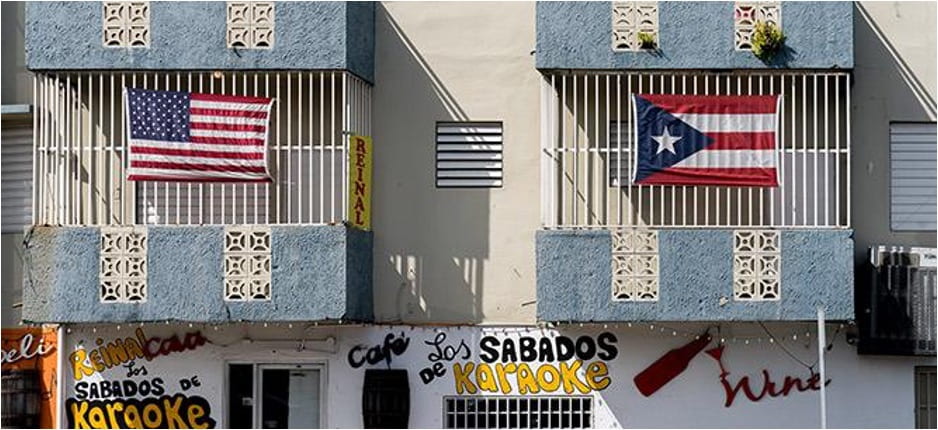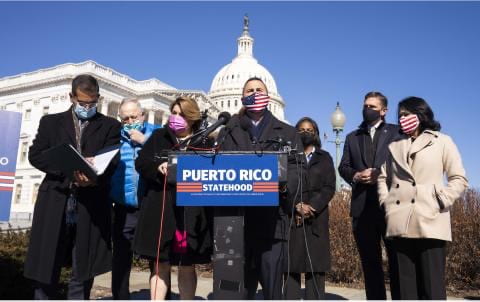
About the Author
Julia García Galindo is a junior in Cabot House studying Sociology with a secondary in Education Studies. She conducts sociological research on DEI efforts in schools, as well as the impact of school closures. Julia intends to pursue a Ph.D. in sociology and conduct research on the Puerto Rican public education system.
The Virus of Inferiority
The Puerto Rican Status Question

An apartment complex in Puerto Rico, one porch has a U.S. flag, while the porch beside it has a Puerto Rican flag. (Lorie Shaull/Flickr)
“¡Yo me iría a U.S.A. si pudiese!” “¡En Estados Unidos todo es mejor!” “Ay, si fuésemos un estado…” There is an illness amongst Puerto Ricans. Not an illness of bone or skin, of the blood or of the heart. No, this is an illness of the mind: The strongly held belief that the United States is more advanced, more equipped, more moral, more good. Put more simply, that the United States is better than Puerto Rico. This is the virus of inferiority, the belief that Puerto Ricans are LUCKY to have a savior like the United States. Nowadays the virus of inferiority is most clearly seen in the pro-U.S.-statehood Puerto Rican movement.
Having lived in the Puerto Rican commonwealth—which means that Puerto Rico is neither a U.S. state nor an independent nation—the first 18 years of my life, I’ve experienced this virus firsthand. When I turned five years old, my mom decided to put me in an all-English school—where all the classes except for Spanish were taught in English. Her hope was that in learning English, I’d gain access to all those gilded American doors of opportunity she struggled to access. This school, like many others in Puerto Rico, went above and beyond to ensure you were barely exposed to Spanish, from only having books in English in the library to making sure all music played was in English. Being surrounded by such an Anglicized academic environment resulted in my Spanish fluency suffering. As I got older, I began to prefer American over Puerto Rican media. Now having seen those American doors, and even walked through some of the heavier, wooden ones, I don’t blame my mom for her decision. Nevertheless I often wonder if I really had to make such a big sacrifice—the ability to enjoy much of my own culture—to do so.
On March 2, 2021, Representatives Jenniffer González-Colón (Puerto Rico’s congressional representative who cannot introduce bills on her own) and Darren Soto introduced Bill H.R. 1522—The Puerto Rico Statehood Admission Act. With 81 co-sponsors, a majority of whom were Democrats, the bill claimed that a November 2020 plebiscite in which 52% of Puerto Rican voters marked yes when asked if they favored statehood was enough proof that that’s what Puerto Ricans desired.

Representatives Jenniffer González-Colón and Darren Soto, as well as Puerto Rican governor Pedro Pierluisi at a press conference for the Puerto Rico Statehood Admission Act. (Darren Soto Press Release)
I found that even more interesting than the bill was the accompanying op-ed both representatives wrote, which shows all too clearly the pervasiveness of the virus of inferiority. In it, they explained why they thought people want statehood, claiming that tired after a barrage of crises, including hurricanes, earthquakes and financial instability Puerto Ricans, “believe that two U.S. senators and four U.S. representatives will help them greatly in resolving these crises.” Here, both representatives perpetuate an image of a weak Puerto Rico, incapable of solving its own issues. Furthermore, they do not acknowledge all the ways the United States enabled the suffering of the Puerto Rican people, whether it be through the imposition of a fiscal board that has enacted severe austerity measures on an already impoverished archipelago or the gross mishandling of Hurricane María which led to the deaths of thousands of people. They play into the United States’ white savior narrative.
In a 2012 Twitter thread, Nigerian-American Teju Cole introduced the idea of the white savior industrial complex. The term refers to how, through their many policies, Global North nations—the same nations that colonized Latin America±—contribute to the crises Global South nations face. Yet, when intervening, rather than frame their actions as acts of justice, they blame the colonized people for the issues and portray themselves as kind saviors. Imperial nations create wounds and then claim to be the doctors.
As bill H.R. 1522 and the accompanying op-ed demonstrate, elites in Global South nations contribute to the success of this myth. They encourage the people to view themselves as weak and in need of saving, rather than acknowledge the legacies of oppression and injustice that resulted in the crises. In the case of Puerto Rico, it results in a criollo elite that frames the status question as an easy, pro-statehood affair where Puerto Ricans should feel honored at the possibility of becoming a state rather than as a matter of finally giving Puerto Ricans the decision-making power over their futures that they deserved all along. The price, to give up parts of our identity and culture just as I gave up fluency in my native language, goes unmentioned.
While nowadays, in Puerto Rico, the pro-statehood movement is the most clearly afflicted with the virus of inferiority, this virus can easily be traced back to the pro-Commonwealth, as in, Puerto Rico’s current colonial relationship with the United States, debates of the 1940s and 1950s.
Luis Muñoz Marín, the first elected Puerto Rican governor on the island, believed that Puerto Ricans needed the United States; in other words, that Puerto Rico should remain a colony, at least for the time being. For most of his early life, Muñoz Marín, argued in favor of independence. He quickly changed his views, however, after founding the Partido Popular Democrático (PPD), a pro-independence, workers’ party, in 1938. From the beginning, the party’s slogan was “Pan, Tierra y Libertad,” encapsulating workers’ concerns for a steady salary, land and freedom.

(Website of the PPD) Logo of the Partido Popular Democrático. At its center is the figure of the jíbaro, the symbol of the Puerto Rican working class.
By 1942, Muñoz Marín began to argue that the only way to guarantee the first two parts of the slogan, a salary and land, for Puerto Rican workers was to sacrifice the third part, freedom. In other words, he believed that Puerto Rico should remain a U.S. colony, or as it would eventually be called, a commonwealth. Many viewed his shift as political suicide. Muñoz Marín would go around arguing in favor of his new position, representing Puerto Rico’s autonomy as a pie which Puerto Ricans would, hopefully, one day be able to control, but for now needed to hand over to the United States. Muñoz Marín’s party, the PPD, used the virus of inferiority to convince people to join their movement and agree with U.S. colonialism. Their approach ultimately was incredibly successful, as Muñoz Marín was immortalized as a great political martyr while the PPD remains one of the main two Puerto Rican political parties.
While the virus of inferiority, with its undertones of white saviorism, has clearly played a large part in United States-Puerto Rico relations, its presence is traceable all the way back to when the Spanish first colonized Puerto Rico. Contrary to popular myth, when the Spanish first arrived to colonize Latin America, most, if not all, indigenous communities resisted. The Tainos, Puerto Rico’s indigenous people at the time of Spanish colonization, were no different. Meanwhile, the Spanish, to justify themselves, argued that their mission was one of salvation, for they were sharing the word of God with poor, “uncivilized” peoples.

Drawing of a Taino cacíque. (From: http://www.sonsofboriken.org/History.html)
Soon after the Spanish arrived, some of the Tainos were infected with the virus of inferiority. After interacting with the Spanish, Taíno cacíque (like a mayor) Guaybanex Caguax believed that his people were too weak to survive any clashes with the Spanish, as Raquel Rosario Rivera recounts in Primeras familias pobladores de Caguas (Caguas: Departamento de Desarrollo Cultural, 2005). Instead, beginning in 1508, he promoted peaceful assimilation (from the Taínos), changing his name to Francisco and becoming a Catholic. Throughout his life, he encouraged his people to play into the Spanish’s savior narrative, even after the Spanish betrayed him, and many of the Taíno people had passed away. It is hard to say whether or not his efforts were successful, as we do not know what would have happened had he not chosen assimilation. Nevertheless, in present-day Puerto Rico, there are no Taino people, as all either died or assimilated into Spanish society.
Ultimately, this is not an argument in favor or against any potential status for Puerto Rico. Clearly, a variety of political statuses have been defended using the virus of inferiority, from statehood to commonwealth. Rather, I make a plea that we nust acknowledge the existence of this virus and reconsider the ways we discuss Puerto Rico’s future. Puerto Ricans have repeatedly been portrayed as weak and incapable, blamed for their own mishaps, rather than acknowledging the forces of oppression and colonialism that resulted in their present status. If we are to have a meaningful discussion on their future, it must be framed, not as a favor from the United States, but rather as an act of justice. Furthermore, we Puerto Ricans must stop being viewed as victims. We are survivors.
More Student Views
Beyond Presence: Building Kichwa Community at Harvard
I recently had the pleasure of reuniting with Américo Mendoza-Mori, current assistant professor at St Olaf’s College, at my current institution and alma mater, the University of Wisconsin-Madison. Professor Mendoza-Mori, who was invited to Madison by the university’s Latin American, Caribbean, and Iberian Studies Program, shared how Indigenous languages and knowledges can reshape the ways universities teach, research and engage with communities, both local and abroad.
Of Salamanders and Spirits
I probably could’ve chosen a better day to visit the CIIDIR-IPN for the first time. It was the last week of September and the city had come to a full stop. Citizens barricaded the streets with tarps and plastic chairs, and protest banners covered the walls of the Edificio de Gobierno del Estado de Oaxaca, all demanding fair wages for the state’s educators. It was my first (but certainly not my last) encounter with the fierce political activism that Oaxaca is known for.
Public Universities in Peru
Visits to two public universities in Peru over the last two summers helped deepen my understanding of the system and explore some ideas for my own research. The first summer, I began visiting the National University of San Marcos (UNMSM) to learn about historical admissions processes and search for lists of applicants and admitted students. I wanted to identify those students and follow their educational, professional and political trajectories at one of the country’s most important universities. In the summer of 2025, I once again visited UNMSM in Lima and traveled to Cusco to visit the National University of San Antonio Abad del Cusco (UNSAAC). This time, I conducted interviews with professors and student representatives to learn about their experiences and perspectives on higher-education policies such as faculty salary reforms and the processes for the hiring and promotion of professors.




